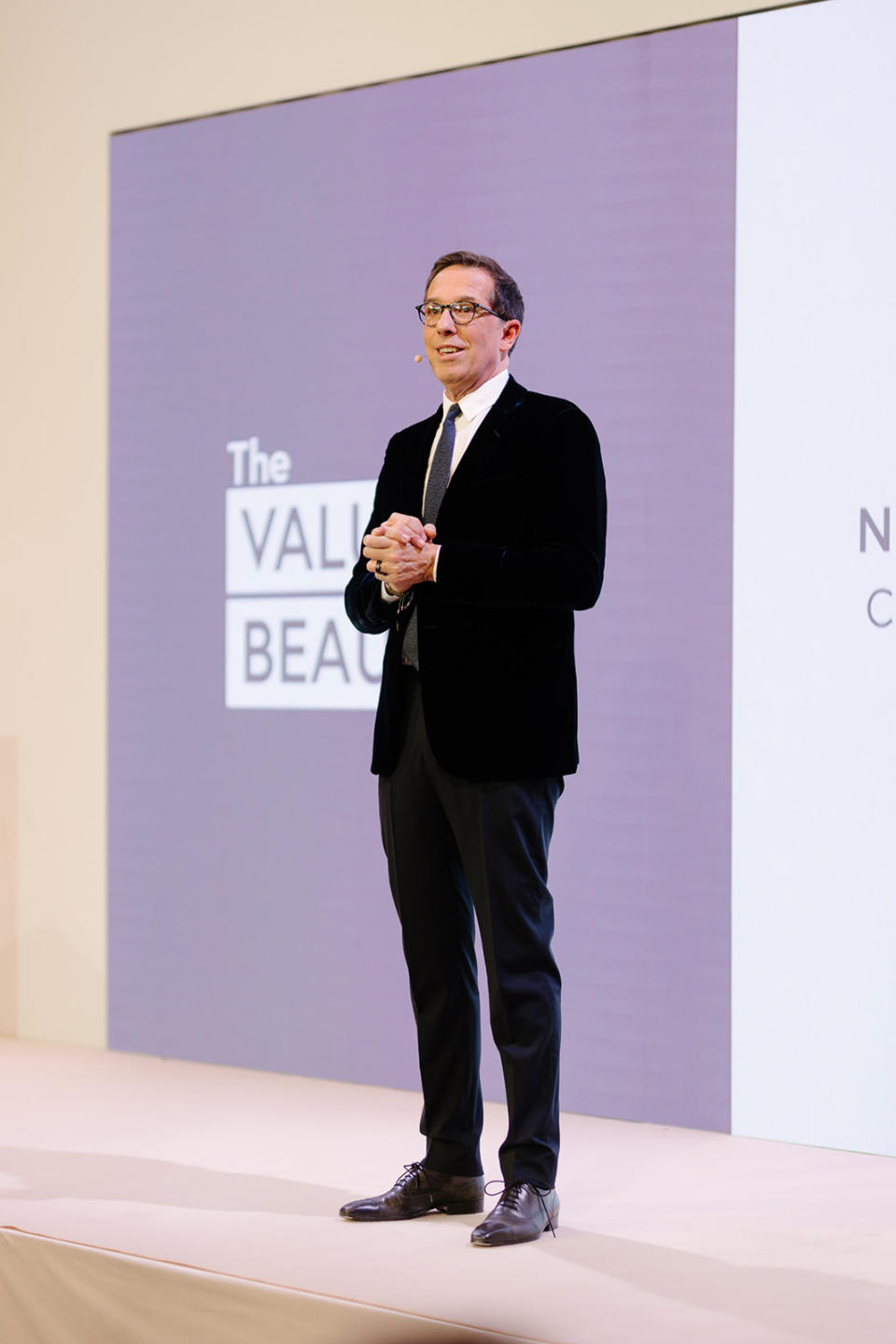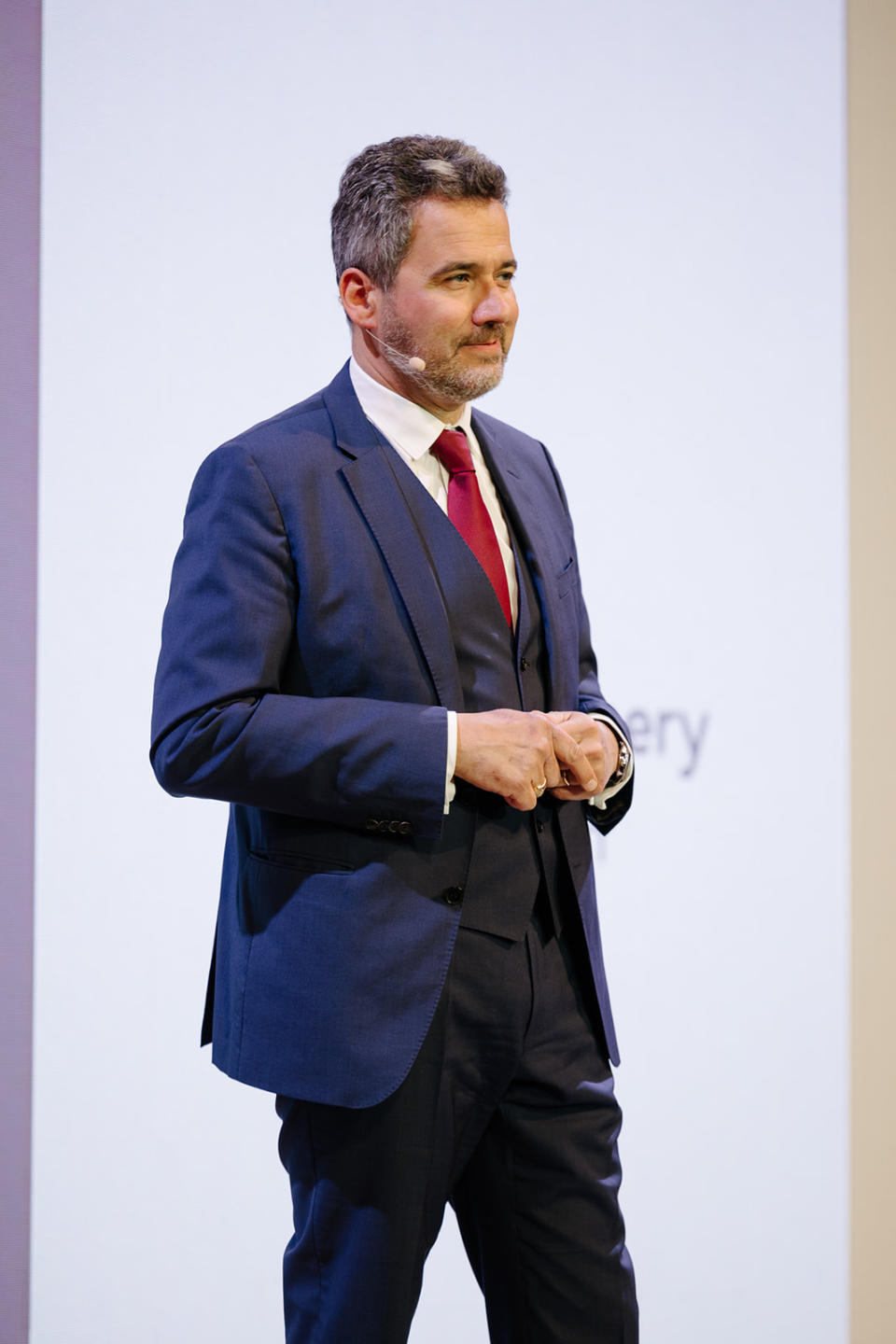BRUSSELS – More than 250 guests filed into Brussels’ stately Museum of Art and History to help launch the Value of Beauty Alliance.
Among those in attendance on Wednesday evening were members of the European Parliament and the European Commission – the hearts and minds the new alliance especially aims to touch as it was formed to underline the importance of the European beauty value chain.
More from WWD
The event featured beauty executives and journalists, who listened to keynote speeches from Nicolas Hieronimus, CEO of L’Oréal, and Vincent Warnery, CEO of Beiersdorf, as well as people from the EU’s governing bodies.
The alliance is the brainchild of Hieronimus and Warnery, and includes four other founders – Givaudan, IFF, Kiko Milan and Ancorotti Cosmetics – whose top executives were on hand to help present a report entitled ‘What is the value of beauty ‘.
This aims to crystallize the role that the beauty value chain plays for the European Union’s economy and innovation; society and culture, and health and well-being.
In his speech, Hieronimus called the alliance “a very important milestone for the European beauty and personal care industry.”
“In an increasingly complex and uncertain world, the beauty and personal care industry is a key contributor and growth channel for economies across the EU, with a value chain firmly rooted in Europe,” he said. “We are a powerhouse of science and innovation, a proud exporter of European cultural heritage and a pioneer in sustainability.
“And of course it is also an industry that brings well-being, happiness and self-confidence to countless millions of people around the world, but of course also in Europe,” Hieronimus continued. “Despite this, our sector is often misunderstood and underestimated – seen as useless and superficial. I’ve heard that often. As a result, we are sometimes faced with increasing challenges and complexities, including when it comes to regulations.
“So the Value of Beauty Alliance wants to change this narrative,” he said. “Our aim is to unveil the beauty of our sector across our entire value chain, celebrating the positive impact of beauty and personal care, and unveiling the ‘Value of Beauty’ report.”


Hieronimus said, ‘Tonight marks the beginning of this journey. Our industry has a very advanced value chain, consisting of farmers and researchers, production, packaging suppliers and distribution.”
He explained that the alliance’s founders represent different facets of the beauty industry.
“I would like to welcome all members of our extended value chain, industry and associations to join hands with this Value of Beauty Alliance,” said the director. “Together we will strengthen our voice and demonstrate the socio-economic significance of our industry in Europe.”
The beauty and personal care industry makes a significant contribution to European economic value and is a key growth driver, Hieronimus continued. The EU beauty market was worth €74 billion in 2022, equivalent to a turnover of €200 million per day.
“This reflects the high regard that EU consumers have for beauty, with 80 percent believing that beauty is very important to their lives,” he said.
Europe is a flagship market for and a major exporter of “high-quality and highly sought-after goods around the world,” Hieronimus continued. “When we go to China or the US, ‘made in Europe’, ‘made in France’, ‘made in Italy’ really make a huge difference in terms of sales.”
In terms of turnover, the EU beauty market ranks second after the US and ahead of China, despite having only a third of the population.
EU exports of beauty products generated almost €24 billion in 2022. “France is the world’s largest exporter of beauty and personal care products,” Hieronimus said.
In 2023, the sector was the third largest contributor to the country’s positive foreign trade balance, after aviation and wines and spirits.
It is estimated that beauty and personal care together generate at least €29 billion in added value to the European economy every year.
“The sector also supports the livelihoods of millions of Europeans, self-employed or working in a variety of companies, such as SMEs or large multinationals, such as L’Oréal,” explains Hieronimus. “In 2022, the sector employed more than three million people across the EU. So the beauty and personal care industry is [a cornerstone] of the European economy, a strong supporter and beneficiary of an internal market, supporting millions of European citizens.”
He described how the sector is a cradle of scientific progress. “Not only can innovation offer consumers a wide range of products, increase product performance and increase the environmental footprint of our industry, it can also ensure that the EU remains at the forefront of competitiveness by combining economic prosperity with scientific ingenuity ,” said Hieronimus. . “In addition to driving business results, all companies now have a responsibility to consider their impact on society and the environment.”
He said the beauty industry has long been committed to protecting the planet and its people, and is working towards sustainable solutions across the value chain.
Hieronimus pointed out that the efforts have been recognized, and in 2022, five beauty companies were among thirteen to receive a triple-A rating from the CPD, out of 15,000 contenders.
“We are also aware that we have a responsibility for human rights in our diverse ecosystem, including working with suppliers who promote ethical and responsible practices and advocate fair working conditions,” Hieronimus said.
“The beauty and personal care industry is embedded in the daily lives of our consumers like almost no other sector,” Warnery continued.


He cited a study showing that the average European consumer uses more than seven beauty and personal care products every day, and almost thirteen different products every week.
Today, nearly 2 billion people worldwide suffer from skin conditions such as acne, eczema and skin cancer, and the incidence of these continues to increase. In Europe, up to 90 percent of the population claims to have some degree of skin sensitivity.
The beauty and personal care industry plays a critical role in helping alleviate such conditions, which can impact patients’ emotional well-being, Warnery said.
For example, sunscreen helps fight melanoma. The number of cases is increasing and has consequences for the European healthcare system, which in 2020 had to pay an estimated €2.7 billion in treatment costs alone.
Beauty and personal care products play a role not only in physical health, but also in emotional well-being.
“The beauty industry also plays a role in connecting European citizens with their shared cultural heritage,” said Warnery, citing the example of fine fragrances. “The beauty and personal care industry helps export the diverse skills of European knowledge, culture and heritage around the world.”
He said the industry also contributes to promoting a more diverse and inclusive society.
“The beauty and personal care industry is a dynamic, ever-evolving sector driven by the relentless pursuit of innovation. With a strong focus on sustainability, this vast and diverse ecosystem extends across Europe,” said Warnery.
He extended the alliance’s invitation to new companies and associations operating in the value chain. “This is an open platform,” says Warnery.
Starting next week, the alliance will begin its positioning campaign and will provide regular updates on its actions and progress throughout the year.
“Symbolically, it is important to be here in Brussels today because this alliance is part of the solution to achieve even better synergies between major players, including European decision-makers,” said Warnery. “The future looks bright for our sector. The key categories of perfume, hair care, skin care and make-up are all expected to grow by around 4 to 6 percent annually, adding billions to the European economy.
“With the support of all stakeholders, we must ensure that we do not fall behind, but continue to increase our competitiveness at a global level so that we can realize the full potential of our industry,” he said.
The best of WWD